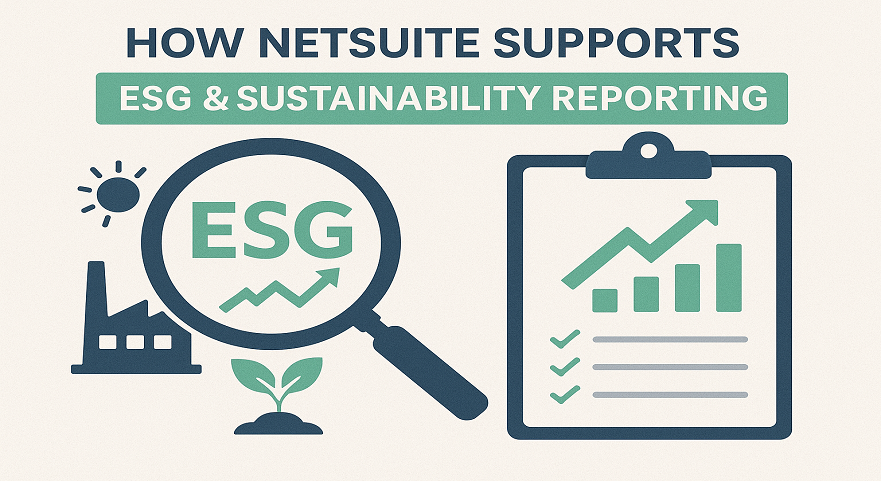How NetSuite Supports ESG & Sustainability Reporting

Understanding ESG & Sustainability Reporting
Organizations are now expected to go beyond profit and demonstrate responsibility towards environmental, social, and governance (ESG) goals. Accurate and transparent ESG reporting is no longer optional—it’s a business imperative. That’s where How NetSuite Supports ESG & Sustainability Reporting becomes critical for modern enterprises aiming to build a sustainable future.
Centralized ESG Data Management
One of the strongest reasons how NetSuite supports ESG & sustainability reporting is its centralized data model. It brings together ESG metrics, financials, and operational data in one cloud-based platform. This ensures:
- Real-time ESG performance tracking
- Seamless integration across departments
- Accurate sustainability disclosures
With unified ESG reporting, companies reduce compliance risks and enhance stakeholder trust. Learn more in NetSuite’s ESG Toolkit.
Automation of Sustainability Workflows
How NetSuite supports ESG & sustainability reporting also includes automating tedious data collection and compliance checks. Automated workflows in NetSuite streamline:
- Carbon footprint tracking
- Supplier ESG compliance
- Diversity and inclusion metrics
- Renewable energy usage monitoring
You can explore NetSuite’s automation capabilities to understand how these workflows adapt to ESG priorities.
Customizable ESG Dashboards & KPIs
Dashboards tailored for sustainability are a prime example of how NetSuite supports ESG & sustainability reporting. These role-based dashboards allow decision-makers to visualize:
- Energy consumption trends
- Emissions by business unit
- Governance policies and audit scores
Whether it’s CSR officers or C-suite executives, all can view ESG KPIs at a glance.
Support for Global ESG Frameworks
Another key area where how NetSuite supports ESG & sustainability reporting stands out is flexibility with global standards. Companies can align their reports with:
- GRI (Global Reporting Initiative)
- SASB (Sustainability Accounting Standards Board)
- TCFD (Task Force on Climate-related Financial Disclosures)
- CSRD (EU Corporate Sustainability Reporting Directive)
This makes NetSuite future-ready for evolving ESG requirements across regions. For global insights, refer to SASB’s official site.
Real-World Industry Use Cases
Whether in manufacturing, services, or retail, how NetSuite supports ESG & sustainability reporting can be customized per industry needs. For example:
- In manufacturing, track carbon emissions and waste by product line
- In retail, monitor ethical sourcing and supply chain impact
- In services, report DEI initiatives and community impact metrics
Learn how NetSuite for Every Industry adjusts ESG support based on sector-specific goals.
Sustainability Reporting Made Scalable
As companies grow, so do their ESG responsibilities. One more reason how NetSuite supports ESG & sustainability reporting is its scalability. Whether a startup or global enterprise, NetSuite adapts to ESG data volume and complexity.
Scalable features include:
- ESG report templates
- Automated audit logs
- Region-specific compliance filters
Learn more about NetSuite’s reporting capabilities.
Benefits at a Glance
Here’s a quick look at how NetSuite supports ESG & sustainability reporting effectively:
- 📊 Unified ESG and financial reporting
- 🔁 Automation of sustainability workflows
- 📌 Customizable dashboards and real-time tracking
- 🌍 Compliance with global ESG frameworks
- 📈 Scalable for future growth
Take Control of Your ESG Strategy
Discover how NetSuite supports ESG & sustainability reporting to help your business become greener, more transparent, and regulation-ready. Partner with Tech i-Vin Technology, your trusted NetSuite implementation partner for expert guidance tailored to ESG goals.
